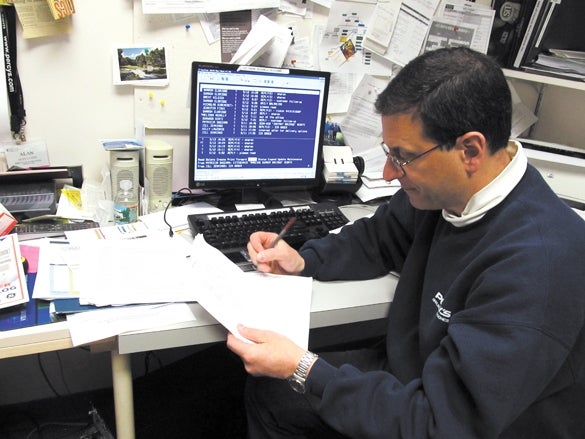Alan Lavine, owner of Percy’s TV and Appliance in Worcester, is frustrated by swipe fees and he’s taken his fight all the way to Washington, D.C.
Lavine and other retail business owners get charged a range of rates when different customers use various types of debit cards. For some customers it’s a 21-cent charge. For other customers, it costs 72 cents every time a debit card is swiped. And for other customers it’s a portion of the transaction amount, such as 2 percent.
The bill Lavine receives each month to pay the interchange fees usually stretches on for multiple pages with individual line items showing each of the different debit cards that were used at his store. Almost every individual card used has a different fee. Even if two customers both use a Visa, for example, one customer’s card might have a rewards program with one rate, while another Visa customer has a completely different rate.
The costs add up for businesses like Lavine’s and others. Convenience store owners say that swipe fees can be one of the top three expenses for a given store.
Legislators in the nation’s capital have taken notice. The Dodd-Frank Wall Street Reform and Consumer Protection Act passed last year included a provision that requires the Federal Reserve to institute swipe fee regulations limiting the amount of interchange fees that certain financial institutions can charge.
But while the rules are supposed to go into effect on July 21, there is movement afoot on Capitol Hill to delay implementation.
Lavine doesn’t like the idea of waiting, so he and two other Worcester business owners went to Washington, D.C., on May 9 and 10 for a “fly-in” to lobby Bay State legislators and prevent any delay.
Capitol Connection
Kevin Parvin of Cyberonic Internet Communications and Kathryn Krock of KJ Baaron’s Fine Wine & Spirits, both in Worcester, joined Lavine in Washington, D.C., on a trip that was paid for by the Reform Swipe Fees Now, a project funded by the Virginia-based Retail Industry Leaders Association.
While in D.C., the business owners met with U.S. Sen. Scott Brown, R-Mass., Rep. Barney Frank, D-Newton, and Rep. James McGovern, D-Worcester. The business owners handed out coffee on the streets outside the U.S. Capitol and urged passersby to pressure legislators to enact swipe fee reforms without delay.
Not everyone is hoping swipe fees will be reformed, however. Local bankers said they’re worried about new regulations from the federal government.
While the Dodd-Frank swipe fee regulations will only apply to financial institutions with assets of $10 billion or more, small banks and credit unions will likely be impacted as well, according to Daniel F. Egan Jr., president of the Marlborough-based Massachusetts Credit Union League. That’s because if big banks reduce their rates, market pressures will force smaller financial institutions to follow suit, he said.
Local bankers agree with Egan’s take.
“It’s an important issue for all banks, not just the super big ones,” said Mark O’Connell, president of Avidia Bank in Hudson. “This will trickle down and impact every bank.”
Interchange charges are important to cover the cost of offering the debit card service, O’Connell said. Having debit cards allows merchants to carry less cash and get instantaneous payment. Financial institutions are also carrying risk related to debit card use. If there is an information breach and sensitive information is hacked, it’s the banks that bear the losses, not the merchants. All of that amounts to a service the banks provide to the merchants, and one they should get compensated for, bankers say.
According to the Reform Swipe Fees Now group, interchange fees are, on average, about 60 cents per transaction. The organization claims that the actual cost for the financial institution to process a debit card transaction is only 4 cents. Bankers dispute the figure, but federal regulators have proposed to cap the interchange fees at 12 cents per transaction.
Egan and O’Connell said a 12-cent cap would hamper institutions’ ability to provide the service. Lavine of Percy’s said a middle ground can be found, which is what he’s hoping for. Even Egan admits there is room to come up with an “appropriate number.” But, it’s unclear what that number is and if it can be found by the July 21 deadline for regulations to be enacted.
That’s why Egan and other bankers are pushing for an extension or delay of the rules being enacted — to give the feds a chance to study the issue. But supporters of the reform claim that delay is akin to repeal. If the reforms do not go into place now, Lavine wonders if they ever will.
No one seems to know for sure. What does seem apparent is that there are organizations with deep pockets willing to spend money to send local business owners from Worcester to Washington D.C. to make the case for them.

